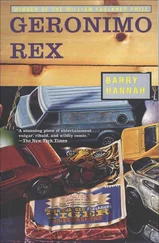A lovely woman hurried into a house, clicking her heels as she took the steps. He thought of his wife and infant son. They lived in a house in Baltimore. His wife was lively and charming. His son was half Indian, because he, False Corn, was an Indian himself, of the old Huron tribe, though he looked mostly Caucasian.
Now he wore a maroon overcoat that hit him at mid-knee. In his right pocket were the notes that would have got him killed if discovered by the law or the soldiers.
He turned and went uptown, climbing the hill from the railroad.
False Corn’s contact was a Negro who pretended, days, to be mad on the streets. At nights he poisoned the bourbon in the remaining officers’ saloons, where colonels and majors drank from the few remaining barrels. Then he loped into a spastic dance — the black forgettable fool — while home-front leaders gasped and collapsed. Apparently the Negro never slept, unless sleep came to him in the day and was overlooked as a phase of his lunacy by passers-by, who would rather not have looked at all.
Isaacs False Corn, the Indian, the spy, saw Edison, the Negro, the contact, on the column of an inn. His coat was made of stitched newspapers. Near his bare feet, two dogs failed earnestly at mating. Pigeons snatched at the pieces of things in the rushing gutter. The rains had been hard.
False Corn leaned on the column. He lifted from his pocket, from amongst the notes, a half-smoked and frayed cheroot. He began chewing on the butt. He did not care for a match at this time. His cheroot was a small joy, cool and tasteless.
“Can you read?” False Corn asked Edison.
“Naw,” said Edison.
“Can you remember?”
“Not too good, Captain.”
“I’m going to have to give you the notes, then. God damn it.”
“I can run fast. I can hide. I can get through.”
“Why didn’t you run out of Virginia a long time ago?”
“I seen I could do more good at home.”
“I want you to stop using the arsenic. That’s unmanly and entirely heinous. That’s not what we want at all.”
“I thought what you did in war was kill, Captain.”
“Not during a man’s pleasure. These crimes will land you in a place beyond hell.”
“Where’s that? Ain’t I already been there?”
“The disapproval of President Lincoln. He freed you. Quit acting like an Italian.”
“I do anything for Abe,” Edison said.
“All you have to do is filter the lines. I mean, get through.”
“That ain’t no trouble. I been getting through long time. Get through to who?”
“General Phil Sheridan, or Custer. Here’s the news: Jeb Stuart is dead . If you can’t remember anything else, just tell them Stuart is dead. In the grave. Finished. Can you remember?”
“Who Jeb Stuart be?” asked Edison, who slobbered, pretending or real.
“Their best horse general. If you never get the notes to them, just remember: Stuart is dead.”
False Corn stared into the purpled white eyes of Edison. One of the dogs, ashamed, licked Edison’s toes. It began raining feebly. False Corn removed his overcoat.
“All my notes are in the right pocket. Can you remember the thing I told you, even if you lose the notes?”
“Stuart is dead. He down,” said Edison.
Passers-by thought it an act of charity. False Corn placed the coat on Edison’s shoulders. What an incident of noblesse oblige , they thought. These hard times and look at this.
False Corn shivered as the mist came in under the gables. He chewed the cigar. Edison rushed away from him up the street, scattering the dogs and pigeons. Do get there, fool, the Indian thought.
False Corn’s shirt was light yellow and soiled at the cuffs. On his wrist he wore a light sterling bracelet. It was his wife’s and it brought her close to him when he shook it on his arm and felt its tender weight. He plunged into the sweet gloom of his absence from her, and her knees appeared to his mind as precious, his palms on them.
In the front room of the hotel a number of soldiers were sitting on the floor, saying nothing. Some of them were cracking pecans and eating them quickly. There was no heat in the building, but it was warmer and out of the mist.
His eye itched. He asked where there might be water. A corporal, pointed. He found a bucket in the kitchen. The water was sour. When he finished the cup, he found a man standing on his blind side. The man held a folded paper in his game hand. His other arm was missing. The brim of his hat was drawn down.
“Mister False Corn?” the man said.
He shouldn’t have known the name. No one else in Richmond was supposed to know his true name. False Corn was swept by a chill. He wished for his pistol, but it was in the chest in his garret, back in the boardinghouse. He took the note.
It read: “Not only is Gen. Stuart dead. The nigger is dead too.” It was in a feminine script and it was signed “Mrs. O’Neal.”
When he looked up, the one-armed man was gone. False Corn pondered whether to leave the kitchen. Since there was nothing else to do, he did. Nobody was looking at him as he made his way out of the lobby. He had determined on the idea of a woman between two mean male faces, the trio advancing before he opened the door.
But he was on the street now.
Nothing is happening to me, he thought. There’s no shot, no harsh shout.
It will be in my room, decided False Corn, opening the door of the garret. Yes, there. There it sits. Where’s the woman?
A bearded man was sitting on the narrow bed, holding a stiff brown hat between his legs. False Corn’s pistol was lying on the blanket beside the man’s thigh. The man was thin. His clothes were sizes large on him. But his voice was soft and mellow, reminiscent.
“Shut the door. I’ve known you since Baltimore, my friend.”
“Who are you?” False Corn said.
“An observer. Mrs. O’Neal. Your career is over.”
This voice , thought False Corn. He stood carefully, a weary statue with severely combed black hair to his nape, center-parted. This man is little, he thought. I can murder him with my hands if he drops his guard, thought False Corn.
“You have a funny name, a big pistol, and you’ve been quite a spy. We know all the women you’ve been with.”
“Then you know nothing. I’ve been with no women.”
“Why not? A man gets lonely.”
“I’ve been more hungry than lustful in these parts. I have a wife, a child.”
I can kill him if he gets too easy, thought False Corn.
“I think I’ll end you with your own pistol. Close your eyes and dream, Isaacs. I’ll finish it off for you.”
“All right,” False Corn said. “The rain has made me sleepy. Allow me to get my robe.”
He picked his robe off the hook without being shot. The robe was rotten at the elbows and smelled of wet dog. But it was familiar to him.
“What a wretched robe,” said the man in that reminiscent voice.
False Corn took a match off his dresser. Isn’t this just to light my cigar? There was a flat piece of dynamite in the collar of the robe. He bent to the side, cupping his hands, and lit the fuse. The fuse was only an inch long. He removed the robe.
“You’ve caught your shoulder on fire, you pig,” cried the man. But it wasn’t a man’s voice now.
False Corn threw the robe toward the voice and fell to the door. No shot rang out. He fumbled at the latch. He saw the robe covering the man’s face. The man was tearing the robe away. His beard dropped, burning, to the floor. False Corn shut the door and lay on the planks of the upper hallway.
There was a shudder and an utterance of rolling light that half split the door. False Corn’s face was pierced by splinters. His good eye hardly worked for the blood rushing out of his eyebrow.
Читать дальше












